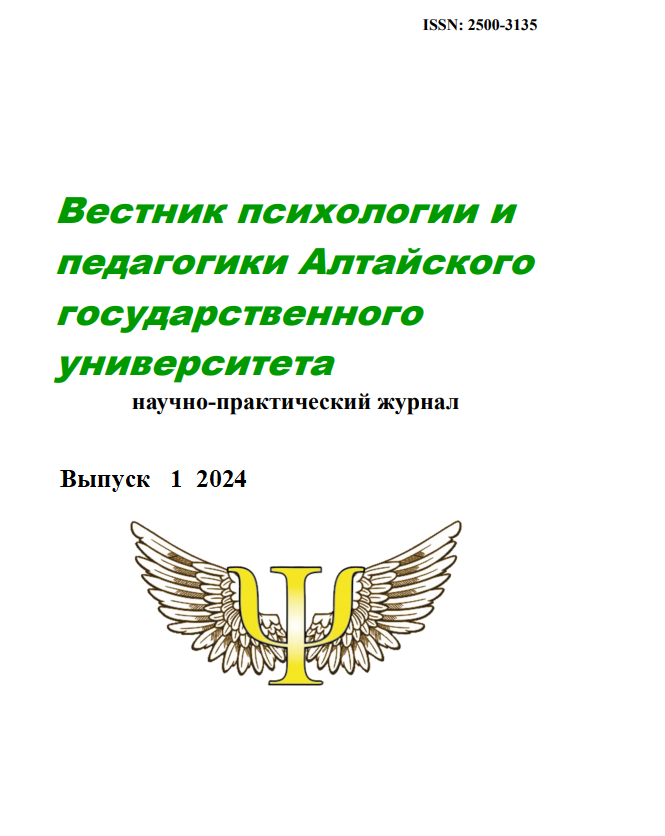SOCIAL INTERACTION AND PERSONALITY ATTITUDES IN MEN AND WOMEN
УДК316.64
Abstract
Gender dynamics in contemporary society are experiencing notable shifts, yet remain relatively unexplored. This study aims to investigate the nuances of social interaction attitudes across men and women with diverse gender personality types. The methods employed include the author's scale for assessing gender personality type, the author's social interaction questionnaire, and regression analysis conducted using IBM SPSS 27.0. The sample comprises 242 participants aged 18 to 70, consisting of 89 men and 153 women. The findings reveal significant variations in attitudes towards social interaction among men with different gender types, particularly in terms of interaction planning, goal orientation, normativity levels, and situational dependency. Similarly, women with varying gender types exhibit pronounced differences in their social interaction attitudes, notably in their tendency to assess others based on actions, goal orientation, and perception of interaction as rational.
Downloads
References
Вавакина Т.С. Проблема исследования партнерства в социальной психологии // Известия Иркутского государственного университета. Серия: Психология. 2018. Т. 25. С. 38-50. DOI: 10.26516/2304-1226.2018.25.38.
Вержибок Г.В. Структура и динамика гендерных отношений белорусских студентов / Психология отношения человека к жизнедеятельности: проблемы и перспективы: сб. науч. трудов; под ред. В.А. Зобкова, А.Л. Журавлёва, А.В. Зобкова. Владимир – Москва : Изд-во «Шерлок-пресс», 2021. С. 42–45.
Врублевская О.А. О сущности понятия «социальное взаимодействие» в научных исследованиях // Сибирский журнал науки и технологий. 2006. № 5 (12). С. 60–65.
Гендерная ментальность российской молодежи: психологический портрет / под науч. ред. О.И. Ключко. СПб. : НИЦ АРТ, 2020. 230 с.
Грачев А.А. Отношение человека к активному социальному объекту: прикладной аспект // Институт психологии Российской академии наук. Социальная и экономическая психология. 2020. Том 5. № 2 (18). С. 419–442.
Клецина И.С., Иоффе Е.В. Психология гендерных отношений. СПб. : Изд-во РГПУ им. А.И. Герцена, 2018. 244 с.
Ковтун Г.С., Куперман А.А. Гендерные представления современной студенческой молодежи (на материале г. Владивостока) // Женщина в российском обществе. 2017. № 1. С. 53–63.
Панов В.И. Экопсихологические взаимодействия: виды и типология // Социальная психология и общество. 2013 № 3. С. 13–27.
Позняков В.П. Психологические отношения человека: современное состояние исследований и перспективы развития концепции // Институт психологии Российской академии наук. Социальная и экономическая психология. 2017. Т. 2. № 2. С. 6–29.
Титова О.И. Маскулинность и фемининность в социальном взаимодействии: сравнительный анализ // СибСкрипт. 2023. Т. 25. № 5. С. 645–654. DOI:10.21603/sibscript-2023-25-5-645-654
Титова О.И. Четырехфакторная модель гендера: структурный анализ // История, современность и перспективы развития психологии в системе Российской академии наук. М. : Изд-во «Институт психологии РАН», 2022. С. 912–914.
Титова О.И., Позняков В.П. Эмпирическая разработка гендерного типа личности // Вопросы психологии. 2023. Том 69. № 1. С. 64–74.
References:
Vavakina T.S. Problema issledovanija partnerstva v social'noj psihologii. Izvestija Irkutskogo gosudarstvennogo universiteta. Serija: Psihologija. 2018. Vol. 25. P. 38–50. DOI: 10.26516/2304-1226.2018.25.38.
Verzhibok G.V. Struktura I dinamika gendernyh otnoshenij belorusskih studentov. Psihologija otnoshenija cheloveka k zhiznedejatel'nosti: problem I perspektivy: sb. nauch. trudov; pod red. V.A. Zobkova, A.L. Zhuravljova, A.V. Zobkova. Vladimir–Moscow: Sherlok-Press, 2021. P. 42–45.
Vrublevskaja O.A. O sushhnosti ponjatija ‘social'noe vzaimodejstvie’ v nauchnyh issledovanijah. Sibirskij zhurnal nauk i itehnologij. 2006. No 5 (12). P. 60–65.
Gendernaja mental'nost' rossijskoj molodezhi: psihologicheskij portret. O.I. Kljuchko (Ed.). Saint Petersburg: NIC ART, 2020. 230 p.
Grachev A.A. Otnoshenie cheloveka k aktivnomu social'nomu ob’ektu: prikladnoj aspekt. Institut psihologii Rossijskoj akademii nauk. Social'naja i ekonomicheskaja psihologija. 2020. Vol. 5. No 2(18). P. 419–442.
Klecina I.S., Ioffe E.V. Psihologija gendernyh otnoshenij. Saint Petersburg: RGPU im. A.I. Gercena, 2018. 244 p.
Kovtun G.S., Kuperman A.A. Gendernye predstavlenija sovremennoj studencheskoj molodezhi: (na materiale goroda Vladivostoka). Zhenshhina v rossijskom obshhestve. 2017. No 1. P. 53–63.
Panov V.I. Ekopsihologicheskie vzaimodejstvija: vidy i tipologija. Social'naja psihologija i obshhestvo. 2013 No 3. P. 13–27.
Poznjakov V.P. Psihologicheskie otnoshenija cheloveka: sovremennoe sostojanie issledovanij i perspektivy razvitija koncepcii. Institut psihologii Rossijskoj akademii nauk. Social'naja i ekonomicheskaja psihologija. 2017. Vol. 2. No 2. P. 6–29.
Titova O.I. Maskulinnost' I femininnost' v social'nom vzaimodejstvii: sravnitel'nyj analiz. SibSkript. 2023. Vol. 25. No 5. P. 645–654. DOI:10.21603/sibscript-2023-25-5-645-654
Titova O.I. Chetyrehfaktornaja model' gendera: strukturnyj analiz. Istorija, sovremennost' i perspektivy razvitija psihologii v sisteme Rossijskoj akademii nauk. Moscow: Institut Psihologii RAN, 2022. P. 912–914.
Titova O.I., Poznjakov V.P. Empiricheskaja razrabotka gendernogo tipa lichnosti. Voprosy Psihologii. 2023. Vol. 69. No 1. P. 64–74.
Bulletin of Psychology and Pedagogy of Altai State University is a golden publisher, as we allow self-archiving, but most importantly we are fully transparent about your rights.
Authors may present and discuss their findings ahead of publication: at scientific conferences, on preprint servers, in public databases, and in blogs, wikis, tweets, and other informal communication channels.
Bulletin of Psychology and Pedagogy of Altai State University allows authors to deposit manuscripts (currently under review or those for intended submission) in non-commercial, pre-print servers such as ArXiv.
Authors who publish with this journal agree to the following terms:
- Authors retain copyright and grant the journal right of first publication with the work simultaneously licensed under a Creative Commons Attribution License that allows others to share the work with an acknowledgement of the work's authorship and initial publication in this journal.
- Authors are able to enter into separate, additional contractual arrangements for the non-exclusive distribution of the journal's published version of the work (e.g., post it to an institutional repository or publish it in a book), with an acknowledgement of its initial publication in this journal.
- Authors are permitted and encouraged to post their work online (e.g., in institutional repositories or on their website) prior to and during the submission process, as it can lead to productive exchanges, as well as earlier and greater citation of published work (See The Effect of Open Access).







